YOUNG FARMERS, BIG CHALLENGES
BY JEANINE MOYER • PHOTOS BY BRYCE MEYER PHOTOGRAPHY
Farming has never been easy, but for those now launching careers in agriculture, the hurdles are higher than ever. “There’s a massive barrier to entry that’s never been there before,” said Evan Shout, co-founder and CFO of Maverick Ag, an agricultural consulting and risk management firm. He believes the higher-than-ever cost to take up farming is the greatest challenge and restriction facing today’s new and young farmers. “These days, it’s hard to start from scratch, you almost need to have a family farm to play in the game.”
Farming is hard to get into, and once you’re there, managing expectations can become the next big problem. Lydia Carpenter, a farm family coach in Belmont, MB, said it’s easy for young farmers to compare themselves to previous generations that have been able to purchase land and upgrade equipment to grow the farm. “There’s almost a new set of restrictions on today’s farmers that make building and accessing land feel unattainable. It’s hard not to compare ourselves, or our perception of success, to what our parents and grandparents achieved.”
According to Shout, the astronomical rise in the price of land and the resulting surge in farm values will also make it harder for the incoming generation to make farms profitable. It’s one of the most compelling reasons he believes farmers must adopt a CEO mindset and approach to farm operations. This shift in management approach demands young farmers treat farming as a career: make a business plan, have a vision and set personal and financial goals. He also believes young farmers must move past operational basics and get up to speed on what it takes to run a business. “Farmers need to think beyond agronomy and technology, they also need to invest in financial and human resources components to make their farms successful,” said Shout.
He noted young farmers should set aside the rugged individualism mentality and the belief they need to do it all themselves. “I’m starting to see young farmers realize they are taking on too much, or they don’t understand how to manage a certain aspect of the business, so they are outsourcing these roles. This is exactly what they need to do, but it’s a big change from how farms have been run in the past.”
Today’s new, young farmers face increasing challenges that include the need to juggle off-farm jobs to support their operations financially, manage farm succession with unprecedented property values and cope with rising levels of loneliness and social isolation. Despite these factors, farming remains one of the most rewarding careers and lifestyles.
Elaine Froese, farm family transition expert located in Boissevain, MB, offered two key pieces of advice to the newest generation of farmers. First, don’t go back to the farm right away. Echoing Shout, she suggests once a young farmer does return, they should formulate a vision and business plan. A firm believer in lifelong learning, Froese recommends youth start their farming career with an off-farm education and build their own work experience before they purchase or return to the farm. She recommends learning business-focused skills that include financial literacy, marketing, communications and most importantly, conflict resolution. “The business plan of an incoming farmer today should look different from the current management of the farm. That’s also why the ability to openly communicate, seek solutions and safely express emotions with the older generation needs to be a key aspect of starting out on the farm, too.”
Froese warns young farmers about the challenges that come with the job, especially workaholic tendencies. “The farm can easily become an all-consuming monster of your time and finances, affect relationships and more,” she said. Her advice is to be intentional with schedules and carve out time for work and rest. This is especially important for young families and farmers who juggle off-farm jobs. Without establishing balance, farmers put their physical and mental health at risk.
The most dangerous phrase in agriculture, said Shout, is, “We’ve always done it this way.” Young farmers must learn to navigate interpersonal relationships and bring a business mindset to decision-making. He recommends they rely on data and information to help with discussions about change on the farm, and to remember that young farmers don’t need to replace the outgoing generation, they need to identify the strengths each generation brings to the farm and work together.
“Farming looks different for this new generation,” said Froese. “Farmers are facing greater risks, managing more zeros on their balance sheet and greater tension when it comes to family dynamics.”
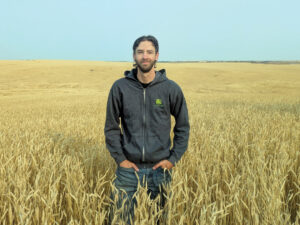
COMING HOME TO GROW
Farming is in Alex Coulton’s blood, but he needed time away from the farm to realize it. “I wasn’t sure I wanted to return to the farm,” admitted the 25-year-old. He began his post-secondary education in pursuit of a mechanical engineering degree but pivoted to complete a crop technology diploma at Lakeland College. “Once I spent some time away, I realized what I was missing: the lifestyle, flexibility and the day-to-day challenges of farming.”
Since 2023, Coulton has farmed full-time alongside his dad as the fourth generation of Coulton Farms. The 2,500-acre farm south of Consort grows canola, lentils and wheat. His first year back on the farm was marked with the greatest drought in recent history. “Everything is looking up since I was able to make it through that first hard year,” he said.
The family, including Coulton’s non-farming siblings, has developed a succession plan to secure his future on the farm. “The transition process is going well,” he said. “Conversations have started, we all understand what’s needed to keep the farm going and we’re building relationships.”
Major investments and upgrades were on hold until Coulton decided to return to the farm. Now he and his dad work diligently to enhance management efficiencies and upgrade technology. Coulton’s first task was to implement new programs to improve documentation, record-keeping and farm management planning. He is also upgrading sections of land by levelling and draining fields. They are also building a positive intergenerational dynamic, and notes his dad is always receptive to new ideas, even when he may be skeptical.
FARMING FORWARD
Since returning to the farm, Coulton has consciously remained connected with friends and classmates. He admits it’s easy to let the farm consume his time, and long work hours can create social isolation. “I know I need to make more of an effort,” he said. “I’ve had the benefit of watching my dad and am fortunate that he’s modelled a healthy work–life balance.”
For Coulton, a large part of managing his mental health is acknowledging what he can and can’t control. He believes weather and commodity markets are two of the largest contributors of stress for farmers and is determined not to lose sleep over them. Though he admits the soaring price of land bothers him. “It’s so much harder for my generation to get into farming and to expand. It’s tough enough competing with other farmers, but now outside investors and institutions are buying up land in our area, too, making it even harder for those of us trying to build a future in farming.”
Even with limited options to expand the farm, Coulton remains optimistic. He points to rising demand for locally produced food as adding value to his farm operation. “Local food demand is opening new doors for young farmers like me,” he said. Consumers increasingly seek Alberta-grown products, he noted, and online marketing tools make it easier to connect with them. He also keeps a close eye on emerging cropping opportunities and management practices to cope with climate change, which has pushed up heat units in his area. As he navigates the early stage of his farming career, he explores new ideas to strengthen the sustainability and long-term success of his family farm.
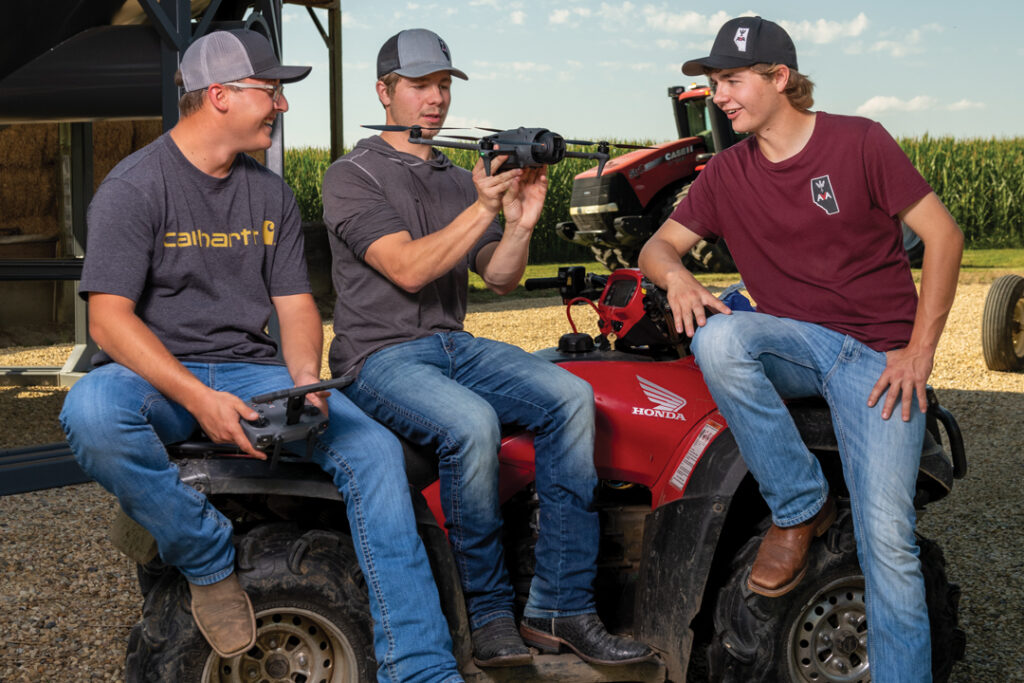
YOUNG, DRIVEN AND FARMING
Farming is better with family—just ask the Grutterink cousins. These three young farmers are securing their place on their family farms and growing their businesses to support multiple family members and generate new income streams.
As the fourth generation of farmers in the Grutterink family, brothers Keith, 22, and Eric, 20, and their neighbouring cousin Cole,18, passionately take on the responsibilities that come with their family farms. All three started farming with the gift of a heifer from their parents. Since then, they have each grown their own beef herds and reinvested profits in building their respective family grain operations, and most recently, Keith and Eric’s custom farming business.
As if they weren’t busy enough, they kicked off their own TikTok channel in 2022, Alberta Agri-Acres. “We wanted to show what farming means from our point of view,” said Eric. “We started playing around, and have built a platform to share, connect and engage with people all over the world.” With nearly 10,000 followers, Keith and Eric are putting their Rimbey farm on the virtual map. They showcase daily life on the farm, and Eric leverages his skills in filming and editing to carve out his own business venture in agri-marketing and promotion.
DIVERSIFY AND THRIVE
When they’re not capturing footage of their farming ventures, Keith and Eric raise cattle and grow alfalfa, barley, canola, corn silage, oats and wheat. They are building a custom field operations business that offers silage chopping and tillage. “We’re focused on diversifying our farm to generate multiple income sources,” said Keith. “Our goal is to sustain multiple siblings and future generations on the farm using only our existing land base.”
Working with his dad and grandpa, Cole takes the same approach and is determined to maximize what he has rather than expand to drive growth. “I want the farm to be more sustainable,” he said. He is focused on reducing inputs, enhancing efficiencies and improving management practices. “I want to do more and do better with our acres and our cattle.”
There’s nothing like farming, said Cole. He was “bit by the farming bug” early in life and has always aspired to farm full-time. After high school, he earned his Class 1 driver’s licence to expand work opportunities.
Keith and Eric both went into carpentry after high school. Keith has since returned to the farm full-time and appreciates the benefits of agricultural work and lifestyle more than ever. Eric continues to work part-time off the farm but is eager to return permanently.
Like most young farmers their age, the cousins believe restricted access to land is the largest barrier to establishment and expansion of farm operations. They cite soaring land values, limited access to capital and stiff competition with larger farms. “You’ve got to be ambitious, disciplined and determined to be successful,” said Cole. “We feel like we need to put everything we have into our farms to achieve our goals.”
While their passion is admirable, Keith pointed out that balancing farm work and the required mental load can be a challenge. The cousins recognize they are fortunate to be a close-knit farm family with strong intergenerational connections. “Farming can get hard, but we know we can turn to each other, our parents and our grandparents for advice and support. Not all farmers or families have that,” said Keith.
“Young farmers need to be given a chance,” added Cole. He knows his family wants to see him employ new ideas, grow and diversify. He believes some established farmers don’t support young family members taking up farming as a career because they believe it isn’t sustainable. “It’s unfair for anyone to impose their beliefs in a way that limits someone else’s opportunities and potential.”
For the Grutterink cousins, farming is a shared legacy, a business and a lifestyle they’re determined to protect and grow.
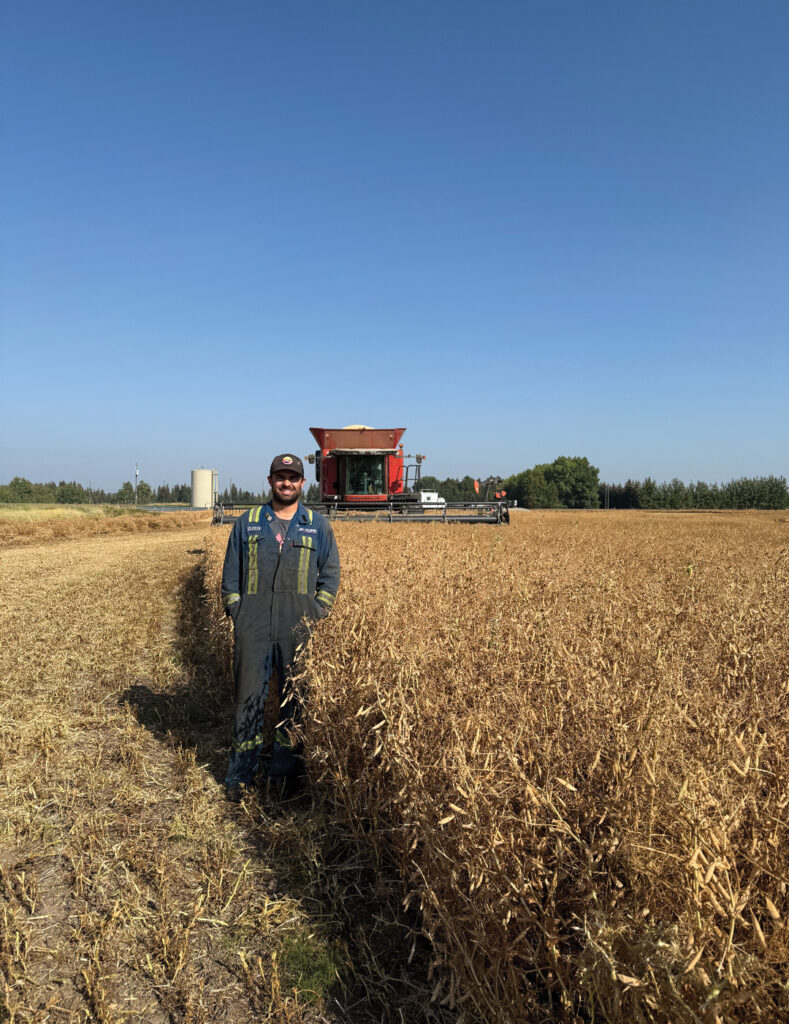
ROOTED IN REALITY
By necessity, Carson Lukocs balances farming with a full-time job. At 27, he loves every aspect of farming, but the soaring cost of land and rent, rising input prices and tight margins keep him in his off-farm job as a mechanical engineer.
He has operated Lukocs Farm for eight years and has steadily grown his 250 acres of canola, barley, oats, peas and wheat near Rimbey. He also lives and works full-time in Calgary, banking overtime and vacation days to use for farm work. He admits this leaves little time for family and friends, but he’s determined to realize his dream to establish a farm. “It’s harder to get into farming now than it ever has been,” he said. “My dad and grandpa had their own challenges, but land values are restricting my generation.”
Growing up, Lukocs couldn’t imagine life off the farm. It’s been his dream to own land and field equipment, and he’s grateful for the family support that has helped him get where he is. He began by learning the fundamentals of farming from his dad and grandpa. Over the years, he rented land from his grandpa and eventually was able to buy land from him. Lukocs continues to grow his land base by renting from neighbours and family. “It’s not easy,” he admits. “There’s stiff competition for rented land, and the prices are steep. If I didn’t have the help of my family, I wouldn’t be where I am today.”
FARMING FOR TOMORROW
While Lukocs values the support and mentorship of his family, he’s ready to carve his own path and challenge the status quo with fresh ideas. He has upgraded crop management practices to improve the sustainability of the land he manages. Focusing on soil health, he has added no-till systems, variable rate seeding and soil sampling. He’s also taking an integrated approach to weed management by rotating multiple herbicide groups to combat herbicide-resistant wild oats and closely follows 4R nutrient management.
“I want to keep our soils healthy by giving back what we take,” said Lukocs. “But it’s always a balancing act between trying new practices and what actually works in terms of cost and labour.”
In the future, he intends to continue to innovate and enhance the sustainability of his land. He consults with agronomists, attends industry events and participates in online forums. He often relies on his dad’s input and appreciates his openness to new ideas.
Like many farmers in his region, Lukocs has had to adapt his crop management strategies to respond to shifting weather patterns. In just a few years of farming, he’s observed moisture decrease due to lighter winter snowpack and an expanded frost window. Despite unpredictability, he’s found a silver lining: with fewer early and late frosts, his harvest season has expanded.
“It’s hard to imagine I’ll ever be able to farm full-time,” said Lukocs, who admits the cost of farming keeps him up at night. While commodity prices are higher today than in recent decades, they still aren’t keeping pace with expenditures. It’s becoming harder to balance the farm business. “If the farm alone can’t support me, I’ll keep working my off-farm job to make it possible to keep doing what I love—farming.”
Tips for first-time farmers
Farmers are never short on advice. There’s always someone with a take on the weather, market trends or the best place for a good cup of coffee. But nothing resonates more with young farmers than hearing from a fellow farmer who’s been through it themselves and is willing to share their story.
Three young but established Alberta Grains’ delegates share their insights on starting a farming career, along with practical tips for making it a success.

Cam MacFarquhar
Cremona, Alberta
Region 2
I worked on our family farm throughout high school and university and have now been farming full-time for six years. I’m the fifth generation on our family farm where we grow barley, canola, peas and wheat with a focus on pedigreed seed production.
I love farming because it provides the ability to build something for yourself and your family, and, of course, the lifestyle that comes along with that. There’s no denying farming is hard work, but once you find a rhythm, you can also find a flexibility that other careers don’t offer.
The best advice I can offer new farmers is to take the big risks early in your career. It’s a lot easier to pay off expensive land and infrastructure when you make these investments early in your career. Big investments may seem stressful, especially if you have a family or employees, but the risk is easier to take and learn from at a younger age. I’d also recommend young farmers be smart about their debt load. I know I just suggested taking risks, but make sure the risk is a smart one. Use debt as a tool but use it wisely. A new combine might feel great, but the ability to buy a neighbour’s quarter-section when the opportunity arises feels even better.
The best resources for new or young farmers are other farmers, especially those willing to pass down knowledge and experience. Never limit yourself to friends and family only, because unbiased opinions can be valuable. A peer group is also a helpful way to learn, connect and share.
I wish someone had told me that patience pays off when I started farming. As young farmers, we tend to want to grow as fast and as big as possible, but that takes its toll both physically and mentally. I’ve learned that working to get the most out of your operation can be more satisfying than being bigger than your neighbour. In time, the opportunity to grow will come, you just need to be patient.

Melissa Damiani
Rimbey, Alberta
Region 3
My husband Jason and I have been farming together for 12 years and grow barley, canola, hay, oats and wheat. Jason has been able to work on the farm full-time for three years, while I still balance an off-farm job in the industry. It’s challenging to farm and have a career off the farm, but they are both rewarding. I’m able to learn new skills and bring home new ideas and opportunities that benefit the farm and our family.
Farming requires risk and sacrifice, especially in the startup years, when so much depends on factors that are out of your control. But, it’s also the most rewarding and wonderful job you can have.
My best advice to young farmers is to never stop learning, keep an open mind and don’t try to do it all yourself. I believe it’s best to focus on what you’re strong at or most passionate about and rely on professionals to help with the rest. It’s also important to take breaks. When you live where you work it can be hard to take a break, but take the time to care for yourself, even when things get busy. Don’t forget to stay positive and be grateful. Celebrate your wins, even the small ones, and learn from the things that don’t work out.
Remember, it’s OK to ask for help, take a break and ask questions. And no matter how hard you try, Mother Nature will always have the final say.

Kolton Brown
Nanton, Alberta
Region 1
I’ve been farming full-time for a decade, growing barley, canola, lentils, peas and wheat. I’m the third generation and while my parents are still very involved, we are in the process of taking over the family farm.
Farming is an amazing lifestyle, but it comes with challenges and stress. I recommend young farmers surround themselves with people who will support them, and your spouse is the most important because they need to understand the long days, late nights, work on weekends and constantly changing plans. You also must be a glass-half-full kind of a person, because life as a farmer will be even more stressful if you have a negative mindset.
I believe the greatest resource for new or young farmers is the network they build. They need to surround themselves with smart, supportive people. Most farmers remember what it’s like to start out and are willing to share advice. Looking back, I wish I’d known that people are willing to help, but you must be willing to ask for it.
I love farming because I can wear many hats in a single day. I have many different roles, and no day is the same. Every day has a new challenge to be solved.




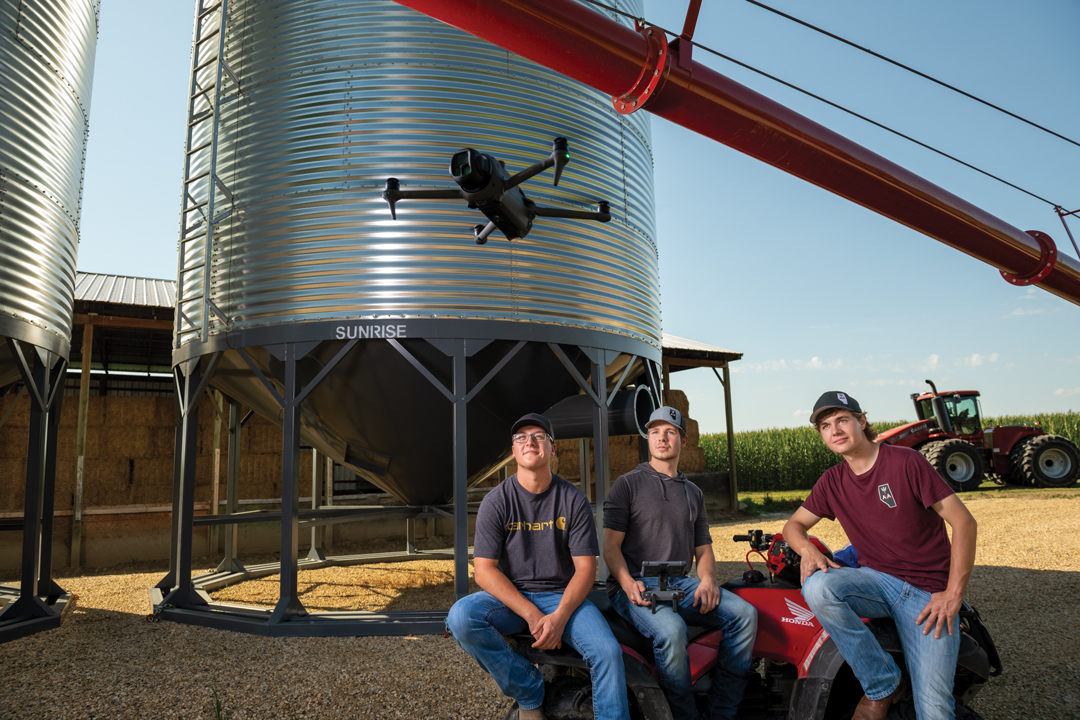
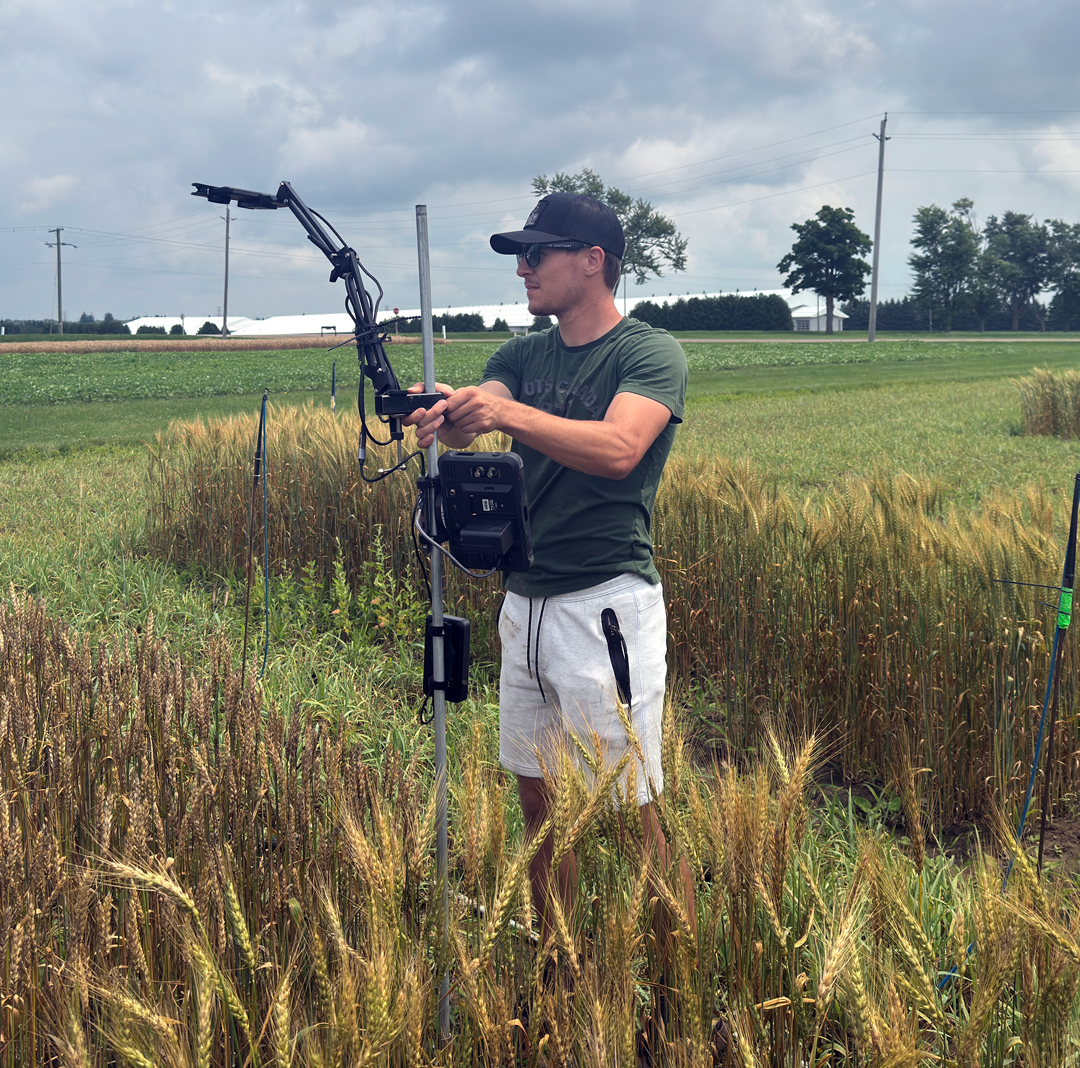

Comments